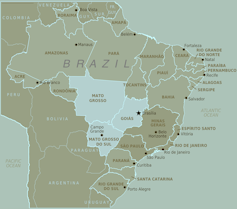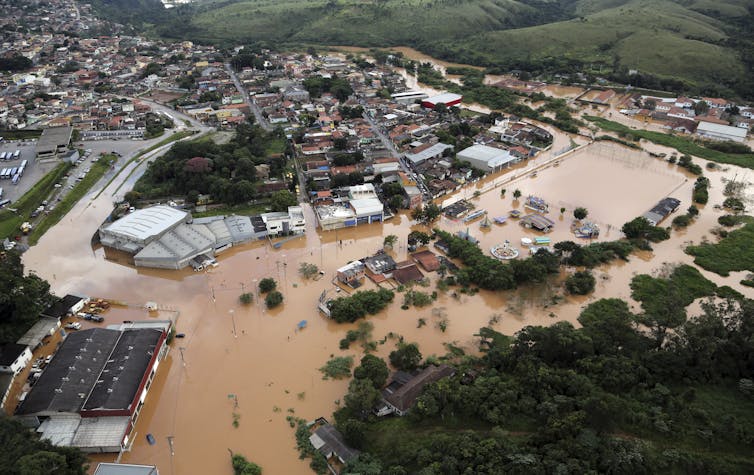Venezuelan refugees inflame Brazil's already simmering migrant crisis
- Written by Robert Muggah, Associate Lecturer, Pontifical Catholic University of Rio de Janeiro (PUC-Rio)
Though refugee and migration crises have dominated headlines in recent years, most news stories exclude Brazil. That’s because of the world’s roughly 62.5 million forced migrants[1], according to the United Nations – just a small proportion are thought to be in Brazil.
New research suggests this omission needs correcting.
According to the Forced Migration Observatory, a new database from the Brazilian think tank Instituto Igarapé, which I co-founded, hundreds of thousands of Brazilians are driven from their homes each year by disasters, development and violent crime.
Venezuelans escaping economic crisis at home are also now pouring into Brazil. Though neighboring Colombia has born the brunt of this exodus – with as many as 1 million migrants[2] settling there since 2015 – Brazil has seen 60,000 crossings from Venezuela[3] and numbers are rising fast[4].
A neglected crisis
Despite this influx, Brazil’s main migrant problem remains the millions of displaced people[5] already inside its borders. This domestic crisis has mostly simmered under the radar for nearly two decades.
In part, that’s because internally displaced people are a politically inconvenient topic in Brazil. Each year, hundreds of thousands of Brazilians driven from their land each year by natural disaster[6], infrastructure development[7] and violence[8] – the three main causes of forced migration in Brazil. But because they are overwhelmingly poor and marginalized, politicians see few upsides to highlighting their plight.
 Upwards of 8.8 million people have been displaced across Brazil since 2000.
Stefan Ertmann and João Felipe/Wikimedia, CC BY[9][10]
Upwards of 8.8 million people have been displaced across Brazil since 2000.
Stefan Ertmann and João Felipe/Wikimedia, CC BY[9][10]
Officials may also be unaware that they exist. In Brazil, migration scholars tend to focus on voluntary population movement[11]: which prosperous Brazilian states are attracting new residents, and which are losing them.
To date, there has been no attempt to compile and analyze comprehensive nationwide data about Brazilian citizens who move – or are moved – against their will.
My team at the Forced Migration Observatory, which launches in mid-February 2018, began this mammoth task in 2016. Pulling information from Brazil’s national development bank, government agencies and non-governmental organizations, we found that a stunning 8.8 million Brazilians – out of a population of 208 million – have been forced to flee their homes since 2000.
Crisis both natural and man-made
Our data analysis shows that natural disasters cause most migration within Brazil. Between January 2000 and June 2017, floods, storms, mudslides and droughts drove 6.4 million people from their homes – or an average of 357,000 people each year[12].
Such disasters have a high price tag. According to the United Nations, floods, mudslides and the like cost Brazil the equivalent of 800 million reals[13] – or US$245 million – each month in recovery, reconstruction and lost productivity. That’s almost 2 percent of its gross domestic product each year.
 Flooding, droughts and other natural disasters drove 6.4 million Brazilians from their homes between January 2000 and June 2017.
Paulo Whitaker/Reuters
Flooding, droughts and other natural disasters drove 6.4 million Brazilians from their homes between January 2000 and June 2017.
Paulo Whitaker/Reuters
Infrastructure development also contributes to Brazil’s migration woes. Since 2000, the country – which before a 2014 recession was among the world’s fastest-growing economies[14] – has built at least 84 large hydroelectric dams[15].
The Forced Migration Observatory estimates that the construction, flooding and environmental changes related to these projects have displaced between 130,000 and 230,000 people. Most of them come from the states of Rio Grande do Sul, Amazonas, Santa Catarina, Minas Gerais and São Paulo.
In total, development schemes have uprooted upwards of 1.2 million Brazilians over the past 18 years.
Many of these citizens, left indigent, head to cities seeking employment. There, they frequently end up in urban slums or on the streets[16], where they become newly vulnerable to development-induced displacement.
In the lead-up to the 2014 World Cup[17] and 2016 Olympic Games[18], both hosted by Brazil, at least 47,000 Brazilians — primarily lower-income residents of big cities like São Paulo and Rio do Janeiro — were forcibly evicted to make way for stadiums, subway lines and new housing.
Brazil’s Ministry of Cities issued a policy[19] to safeguard the rights of people involuntarily removed from their homes in 2013, but implementation has been sporadic. In practice, most cities and towns have no strategy in place to support new arrivals, whether they hail from Venezuela or just down the block[20].
Homicide epidemic
Crime and violence[21] also uproot many Brazilians each year, but data on this critical driver of migration is not good.
An analysis of the nonprofit Pastoral Land Commission’s annual report[22] reveals that approximately 1.1 million Brazilians were evicted or expelled by land and resource disputes since 2000. Such clashes can be deadly: In 2016, 61 land rights activists were killed in Brazil[23].
What migration researchers still don’t know is how much urban violence – which has reached epidemic proportions in recent years[24] – is compelling city dwellers to move. More than three-quarters of the 57,395 Brazilians murdered[25] in 2017 lived in cities, so it’s reasonable to assume that some residents would flee their neighborhoods to escape violence[26].
Indeed, in Rio, where gangs now run many of the poorer informal neighborhoods called “favelas”[27], the news shows that entire families[28] are routinely extorted and evicted by organized crime[29]. We just don’t know how many.
A rough neighborhood
The current unrest in Venezuela is compounding these already significant domestic migration challenges for Brazil, where an estimated 60,000 refugees from the crisis-stricken country[30] have sought refuge from starvation, violence and repression[31].
Historically, Brazilian politicians and diplomats have often made a show of welcoming international refugees. In recent years, the country has won plaudits for inviting in more than 65,000 Haitians[32] after that country’s 2010 earthquake and promising to accept 100,000 Syrian refugees[33].
A souring economy and dampened public mood, however, have since compelled Brazilian authorities to reneg[34] on their Syria commitment.
Today’s Venezuelan refugees are streaming into frontier towns in Brazil’s northwest border. Cash-strapped governments in this region are generally unable to provide adequate care for the many asylum-seekers who arrive needing treatment[35] for dehydration, malnutrition and disease.
Brazil’s National Immigration Council started issuing two-year residence permits for refugees[36] in March 2017. The documents give migrants access to health care and other public services, but at $100 apiece, they’re out of reach for most.
Nor has the Brazilian government adequately funded measures to protect asylum applicants, such as shelter or food. Thomson Reuters reported in January[37] that many Venezuelans “sleep in tents pitched in public squares … while others beg in the streets and wash car windshields.”
Brazil has responded by tightening security, including military and police patrols[38], along the border. Venezuelans fleeing their country may soon be required to show that they’ve been vaccinated[39] before entering Brazil, and plans to “relocate[40]” new arrivals to refugee camps to elsewhere in the country have raised human rights concerns. Some officials believe that the border with Venezuela should be closed entirely[41].
Under international humanitarian law[42], Brazil’s national government bears the primary responsibility for resettling and supporting refugees both domestic and international. All of the country’s displaced citizens are additionally entitled to care and compensation[43].
In practice, though, government responsibility for dealing with migrants is distributed across various federal ministries and departments[44]. As a result, Brazil has no unified resettlement program[45] to respond to the millions of displaced people scattered across the country[46].
This, in my opinion, has now become a crisis. And it’s past time to act.
Maiara Folly, a researcher at the Igarapé Institute, co-authored this article.
References
- ^ 62.5 million forced migrants (www.unhcr.org)
- ^ as many as 1 million migrants (www.theguardian.com)
- ^ seen 60,000 crossings from Venezuela (www.bloomberg.com)
- ^ numbers are rising fast (www.reuters.com)
- ^ displaced people (www.unhcr.org)
- ^ natural disaster (www.trt.net.tr)
- ^ infrastructure development (diretrizes-grandesobras.gvces.com.br)
- ^ violence (www.telesurtv.net)
- ^ Stefan Ertmann and João Felipe/Wikimedia (upload.wikimedia.org)
- ^ CC BY (creativecommons.org)
- ^ voluntary population movement (fernandonogueiracosta.wordpress.com)
- ^ 357,000 people each year (s2id.mi.gov.br)
- ^ 800 million reals (nacoesunidas.org)
- ^ was among the world’s fastest-growing economies (tradingeconomics.com)
- ^ built at least 84 large hydroelectric dams (www.devex.com)
- ^ in urban slums or on the streets (academic.oup.com)
- ^ 2014 World Cup (www.washingtonpost.com)
- ^ 2016 Olympic Games (www.latimes.com)
- ^ Ministry of Cities issued a policy (www.citiesalliance.org)
- ^ from Venezuela or just down the block (www.theguardian.com)
- ^ Crime and violence (theconversation.com)
- ^ Pastoral Land Commission’s annual report (www.cptnacional.org.br)
- ^ killed in Brazil (www.reuters.com)
- ^ reached epidemic proportions in recent years (theconversation.com)
- ^ 57,395 Brazilians murdered (www2.datasus.gov.br)
- ^ flee their neighborhoods to escape violence (academic.oup.com)
- ^ where gangs now run many of the poorer informal neighborhoods called “favelas” (oglobo.globo.com)
- ^ entire families (g1.globo.com)
- ^ organized crime (m.extra.globo.com)
- ^ an estimated 60,000 refugees from the crisis-stricken country (www.bloomberg.com)
- ^ starvation, violence and repression (theconversation.com)
- ^ inviting in more than 65,000 Haitians (www.miamiherald.com)
- ^ promising to accept 100,000 Syrian refugees (brightthemag.com)
- ^ reneg (news.vice.com)
- ^ needing treatment (www.reuters.com)
- ^ issuing two-year residence permits for refugees (www.hrw.org)
- ^ reported in January (news.trust.org)
- ^ including military and police patrols (br.reuters.com)
- ^ show that they’ve been vaccinated (www.folhabv.com.br)
- ^ relocate (g1.globo.com)
- ^ border with Venezuela should be closed entirely (www2.camara.leg.br)
- ^ international humanitarian law (www.ijrcenter.org)
- ^ compensation (www.law.georgetown.edu)
- ^ is distributed across various federal ministries and departments (academic.oup.com)
- ^ resettlement program (www.americasquarterly.org)
- ^ the millions of displaced people scattered across the country (www.economist.com)
Authors: Robert Muggah, Associate Lecturer, Pontifical Catholic University of Rio de Janeiro (PUC-Rio)

